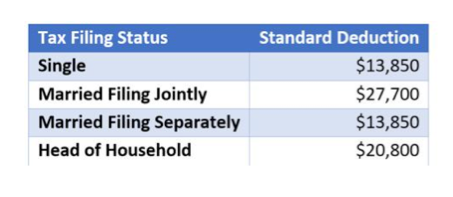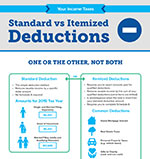The FEIE Standard Deduction: What it is for digital nomads
Understanding the Foreign Earned Earnings Exemption and Its Effect On Your Common Deduction
The Foreign Earned Earnings Exclusion (FEIE) supplies significant advantages for migrants, permitting them to leave out a portion of their foreign-earned revenue from united state taxation. Asserting the FEIE can make complex one's tax obligation circumstance, especially relating to the basic reduction. Recognizing this communication is crucial for individuals living abroad. As migrants navigate these complexities, they should consider exactly how their options affect their general tax obligation obligation. What approaches can they employ to enhance their financial end results?
What Is the Foreign Earned Income Exclusion (FEIE)?
The Foreign Earned Income Exclusion (FEIE) functions as an essential tax advantage for united state people and resident aliens functioning abroad. This stipulation permits qualified individuals to exclude a substantial portion of their foreign-earned revenue from united state tax, successfully minimizing their overall tax problem. The FEIE aims to alleviate the economic stress on expatriates and motivates Americans to seek employment chances in foreign markets. The exclusion uses to wages, wages, and professional charges gained while residing in an international country. The optimal exemption amount is changed annually for rising cost of living, making certain that it continues to be relevant to present financial problems. By using the FEIE, expatriates can retain more of their earnings, cultivating monetary security while living overseas. On the whole, the FEIE plays an essential duty fit the financial landscape for Americans abroad, promoting a smoother change to global work settings and advertising economic engagement on a worldwide scale.
Eligibility Needs for the FEIE
Qualification for the Foreign Earned Earnings Exemption (FEIE) is contingent upon meeting specific requirements established by the Internal Revenue Service (INTERNAL REVENUE SERVICE) Primarily, individuals need to be united state people or resident aliens that earn income while residing in a foreign nation. To certify, they need to please one of two key tests: the Physical Visibility Examination or the Bona Fide Home Test.
The Physical Visibility Examination needs people to be literally existing in a foreign nation for at the very least 330 complete days within a 12-month duration - FEIE Standard Deduction. Conversely, the Bona Fide House Examination requires that people develop residency in an international country for a continuous period that includes a whole tax obligation year
In addition, the revenue should be stemmed from personal solutions executed in the international country. Meeting these demands enables taxpayers to exclude a significant section of their foreign-earned revenue from U.S. tax, therefore lowering their total tax responsibility.
How to Assert the FEIE

To start the process, individuals should gather documents that confirm their international earnings, such as pay stubs, income tax return from international nations, and any type of pertinent employment agreement. It is essential to ensure all revenue claimed under the FEIE is earned from international resources and meets the required thresholds.
Additionally, taxpayers have to take into consideration submitting deadlines and any type of feasible extensions. Claiming the FEIE appropriately not just aids in lessening tax obligation liability however also guarantees compliance with IRS guidelines. Appropriate documentation and adherence to standards are crucial for an effective case of the Foreign Earned Earnings Exclusion.
The Interaction Between FEIE and Conventional Reduction
The interaction between the Foreign Earned Revenue Exclusion (FEIE) and the standard deduction is a vital aspect of tax obligation preparation for expatriates. Recognizing the fundamental concepts of FEIE, along with the constraints of the conventional deduction, can significantly influence tax filing methods. This area will explore these aspects and their ramifications for taxpayers living abroad.
FEIE Fundamentals Clarified
While many migrants look for to lower their tax obligation burden, comprehending the communication in between the Foreign Earned Earnings Exemption (FEIE) and the standard reduction is crucial. The FEIE allows united state people and resident aliens living abroad to omit a certain amount of foreign earned earnings from U.S. taxes. This exemption can greatly reduce taxable revenue, potentially affecting qualification for other deductions, such as the standard deduction. Incredibly, individuals who assert the FEIE can not likewise take Full Article the conventional deduction versus the left out income. Consequently, expatriates have to meticulously evaluate their complete income and deductions to maximize their tax obligation scenario. Recognition of these communications can result in even more informed financial choices and far better tax obligation methods for expatriates steering with their special circumstances.
Standard Deduction Limitations
Comprehending the restrictions of the typical reduction in connection with the Foreign Earned Revenue Exemption (FEIE) is necessary for expatriates navigating their tax obligations. While the FEIE enables certifying individuals to leave out a certain amount of foreign-earned earnings from U.S. taxes, it can influence the conventional reduction they are qualified to claim. Specifically, taxpayers that assert the FEIE can not additionally declare the conventional deduction on that excluded earnings. Furthermore, if an expatriate's overall income falls below the typical reduction limit, they may not take advantage of it whatsoever. This interaction requires cautious planning to optimize tax obligation benefits, as underutilizing the conventional deduction can result in higher gross income and raised tax liability. Comprehending these restrictions is essential for efficient tax obligation strategy.
Tax Declaring Effects
Steering the tax obligation filing ramifications of the Foreign Earned Income Exemption (FEIE) needs cautious consideration of how it communicates with the typical reduction. Taxpayers utilizing the FEIE can omit a substantial part of their foreign-earned revenue, yet this exemption impacts their qualification for the standard reduction. Specifically, if an individual claims the FEIE, they can not additionally assert the conventional reduction for that earnings. This can bring about a lower general tax obligation but might complicate the declaring process. In addition, taxpayers should ensure conformity with IRS needs when submitting Type 2555 for the FEIE. Understanding these interactions is crucial for enhancing tax obligation benefits while preventing potential challenges in the declaring process. Cautious planning can make the most of advantages and decrease liabilities.
Prospective Tax Obligation Ramifications of Using the FEIE
The Foreign Earned Earnings Exemption (FEIE) uses substantial tax advantages for united state people functioning abroad, however it additionally features potential effects that warrant mindful factor to consider. One significant effect is the influence on eligibility for sure tax obligation debts and useful source deductions. By electing to utilize the FEIE, taxpayers might inadvertently reduce their modified gross earnings, which can restrict access to credit scores like the Earned Income Tax obligation Credit or minimize the amount of basic reduction readily available.
Furthermore, individuals who utilize the FEIE might deal with difficulties when returning to the U.S. tax obligation system, especially worrying the taxation of future income. The exclusion applies just to gained revenue, suggesting various other income kinds, such as rewards or rate of interest, stay taxable. This distinction demands thorough record-keeping to assure compliance. Ultimately, the FEIE may impact state tax commitments, as some states do not acknowledge the exemption and may tire all earnings made by their residents, no matter where it is gained.
Tips for Maximizing Your Tax Obligation Benefits While Abroad
While functioning abroad can be improving, it also offers one-of-a-kind opportunities to maximize tax benefits. To take full advantage of these advantages, people must initially identify their eligibility for the Foreign Earned Income Exclusion (FEIE) and consider the physical presence test or the authentic house examination. Maintaining comprehensive documents of all earnings gained and expenditures sustained while overseas is crucial. This paperwork sustains claims for credit scores and deductions.
In addition, understanding the tax obligation treaties in between the USA and the host nation can help prevent dual taxation. Individuals should also discover payments to tax-advantaged accounts, such as Individual retirement accounts, which might offer more reductions.

Consulting a tax specialist specializing in expatriate tax law can offer tailored techniques and guarantee compliance with both United state and foreign tax obligations. By taking these actions, expatriates can successfully improve their monetary circumstance while living see page abroad.
Frequently Asked Inquiries
Can I Make Use Of FEIE if I Help a Foreign Federal government?
Yes, an individual can make use of the Foreign Earned Income Exclusion (FEIE) while benefiting a foreign federal government, provided they fulfill the requisite problems described by the internal revenue service, consisting of the physical presence or authentic residence tests.

Does FEIE Put On Self-Employment Revenue?
The Foreign Earned Earnings Exclusion (FEIE) does relate to self-employment revenue, gave the private fulfills the necessary requirements. Eligible independent individuals can leave out certifying income earned while living in an international country from tax.
What if My Foreign Earnings Exceeds the FEIE Limitation?
The excess amount might be subject to U.S. taxes if foreign income exceeds the FEIE limitation. Taxpayers need to report and pay taxes on the income above the exemption threshold while still taking advantage of the exemption.
Can I Assert the FEIE and Detail Reductions?
Yes, people can declare the Foreign Earned Income Exemption (FEIE) while likewise itemizing reductions. They have to be aware that declaring the FEIE might affect the availability of particular itemized deductions on their tax return.

Just How Does FEIE Affect My State Tax Obligation Responsibilities?
The Foreign Earned Income Exemption can lower state tax commitments, as several states follow federal guidelines. Private state policies vary, so it's crucial to seek advice from state tax obligation guidelines for specific ramifications on tax responsibilities.
The Foreign Earned Earnings Exclusion (FEIE) supplies substantial benefits for migrants, enabling them to exclude a section of their foreign-earned earnings from United state tax. While several expatriates seek to reduce their tax worry, recognizing the interaction in between the Foreign Earned Income Exclusion (FEIE) and the standard reduction is important. Understanding the limitations of the typical reduction in relation to the Foreign Earned Earnings Exclusion (FEIE) is necessary for expatriates navigating their tax obligation responsibilities. The exclusion applies only to earned earnings, meaning other revenue types, such as rewards or interest, remain taxable. The Foreign Earned Income Exclusion (FEIE) does use to self-employment revenue, supplied the individual satisfies the necessary demands.